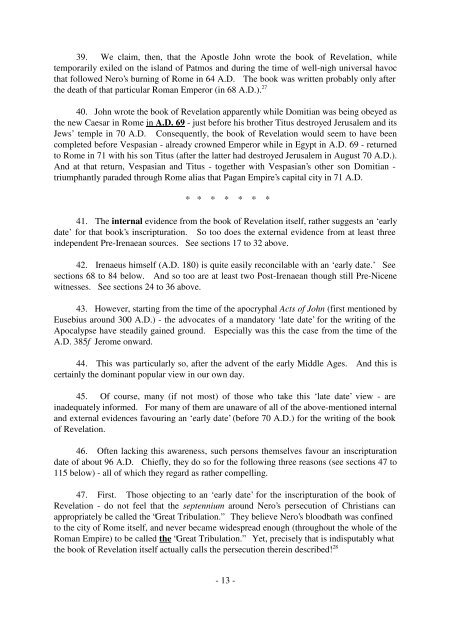JERUSALEM; ROME; REVELATION - The Preterist Archive
JERUSALEM; ROME; REVELATION - The Preterist Archive
JERUSALEM; ROME; REVELATION - The Preterist Archive
You also want an ePaper? Increase the reach of your titles
YUMPU automatically turns print PDFs into web optimized ePapers that Google loves.
39. We claim, then, that the Apostle John wrote the book of Revelation, while<br />
temporarily exiled on the island of Patmos and during the time of well-nigh universal havoc<br />
that followed Nero’s burning of Rome in 64 A.D. <strong>The</strong> book was written probably only after<br />
the death of that particular Roman Emperor (in 68 A.D.). 27<br />
40. John wrote the book of Revelation apparently while Domitian was being obeyed as<br />
the new Caesar in Rome in A.D. 69 - just before his brother Titus destroyed Jerusalem and its<br />
Jews’ temple in 70 A.D. Consequently, the book of Revelation would seem to have been<br />
completed before Vespasian - already crowned Emperor while in Egypt in A.D. 69 - returned<br />
to Rome in 71 with his son Titus (after the latter had destroyed Jerusalem in August 70 A.D.).<br />
And at that return, Vespasian and Titus - together with Vespasian’s other son Domitian -<br />
triumphantly paraded through Rome alias that Pagan Empire’s capital city in 71 A.D.<br />
* * * * * * *<br />
41. <strong>The</strong> internal evidence from the book of Revelation itself, rather suggests an ‘early<br />
date’ for that book’s inscripturation. So too does the external evidence from at least three<br />
independent Pre-Irenaean sources. See sections 17 to 32 above.<br />
42. Irenaeus himself (A.D. 180) is quite easily reconcilable with an ‘early date.’ See<br />
sections 68 to 84 below. And so too are at least two Post-Irenaean though still Pre-Nicene<br />
witnesses. See sections 24 to 36 above.<br />
43. However, starting from the time of the apocryphal Acts of John (first mentioned by<br />
Eusebius around 300 A.D.) - the advocates of a mandatory ‘late date’ for the writing of the<br />
Apocalypse have steadily gained ground. Especially was this the case from the time of the<br />
A.D. 385f Jerome onward.<br />
44. This was particularly so, after the advent of the early Middle Ages. And this is<br />
certainly the dominant popular view in our own day.<br />
45. Of course, many (if not most) of those who take this ‘late date’ view - are<br />
inadequately informed. For many of them are unaware of all of the above-mentioned internal<br />
and external evidences favouring an ‘early date’ (before 70 A.D.) for the writing of the book<br />
of Revelation.<br />
46. Often lacking this awareness, such persons themselves favour an inscripturation<br />
date of about 96 A.D. Chiefly, they do so for the following three reasons (see sections 47 to<br />
115 below) - all of which they regard as rather compelling.<br />
47. First. Those objecting to an ‘early date’ for the inscripturation of the book of<br />
Revelation - do not feel that the septennium around Nero’s persecution of Christians can<br />
appropriately be called the “Great Tribulation.” <strong>The</strong>y believe Nero’s bloodbath was confined<br />
to the city of Rome itself, and never became widespread enough (throughout the whole of the<br />
Roman Empire) to be called the “Great Tribulation.” Yet, precisely that is indisputably what<br />
the book of Revelation itself actually calls the persecution therein described! 28<br />
- 13 -
















